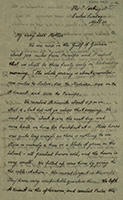Zona de identificação
Código de referência
Título
Data(s)
- 20 Apr. 1919 (Produção)
Nível de descrição
Dimensão e suporte
1 folded sheet
Zona do contexto
Nome do produtor
Entidade detentora
História do arquivo
Fonte imediata de aquisição ou transferência
Zona do conteúdo e estrutura
Âmbito e conteúdo
Transcript
The “Portugal”
Easter Sunday | April 20.
My very dear Mother
We are now in the Gulf of Guinea about 700 miles from Principe and I expect that we shall be there fairly early on Wednesday morning. The whole journey is about 4700 miles—1000 miles to Lisbon, 530 to Madeira, 1040 on to St Vincent and 2100 to Principe.
We reached St Vincent about 5 p.m on April 13, but did not go ashore that evening. We went on shore about 8.am the next day and came back in time for breakfast at 11. Three hours was quite long enough as there is nothing to see. There is scarcely a tree or a blade of grass on the island—all parched brown soil, and the town is very small. We filled up some time by going to the cable-station—the second largest in the world—They have very comfortable quarters there. We left St Vincent in the afternoon, and reached Praīa the capital of the Cape Verde Islands, situated on the island of S. Thiago the next morning. We only stayed there four hours, and did not go ashore. It looked very uninteresting and the island was almost as barren as S. Vincent.
Since reaching S. Vincent the weather has been damp, and rather misty though there is always hot sunshine. The temperature in the shade is 84 now, and it is generally over 80; the dampness makes it seem rather oppressive and it gets very close in the cabin—especially between 5 and 7∙a.m. when the porthole is closed whilst they wash the decks. Curiously enough I have been sleeping extremely well on this ship—I slept rather badly on the Anselm and at Madeira, but from the first night on board I have had extraordinarily good nights for me, and they still continue in spite of the oppressive heat.
Three of the English passengers left at S. Vincent, going to the cable station. One of them was a very nice fellow but we saw very little of him till the last day as he was a bad sailor. The other two were rather queer fish. There are now three English passengers besides ourselves—the sugar-refiner, the missionary and another Englishman who joined at St. Vincent. I thought at one time the sugar-refiner & the missionary were going to make a match of it, but I dont think there is anything in it now. There is one Portuguese Officer (in the army—not ship’s officer) who speaks English well and we see a lot of him. The Purser speaks a little English and is very pleasant.
The Portuguese were having some round games and tricks one evening which were quite amusing to watch. They were having the old trick of saying “botas sem sapotas”—“boots without shoes”, which was very funny as scarcely any knew it and they were all trying it at once. On Good Friday they had very good sports in which we joined—cock-fighting, egg and spoon races, threading the needle, and for the ladies a potatoe† race. Last night there was some function in the saloon; I have only the vaguest idea, what the speeches were about or what was the occasion, but I suddenly found that I had got to make a speech on behalf of the English passengers, which was translated sentence by sentence into Portuguese by the Portuguese Officer.
They give us ices now at tea time—or rather sorbets like we used to have on the Avon—but at that time it is the tea that is most appreciated. The food is not very attractive to our English tastes.
I do not know anything of what has been happening in the world generally since I left England. I have seen a Times for March 31, but that is the only newspaper I have seen except for the local Madeira paper which contained no general news. I have spent a bit of time learning Portuguese. I can read it pretty easily now, but I have scarcely begun to understand people speaking; it is very difficult to catch the sounds.
I expect the garden will have begun to look pretty now, and the May term will soon be beginning. I hope all goes well.
With very dear love from
your affectionate son
Stanley
—————
Numbered ‘6th’ at the head. Four passages have been marked off in pencil, and in one case emended, by a later hand.
† Sic.

